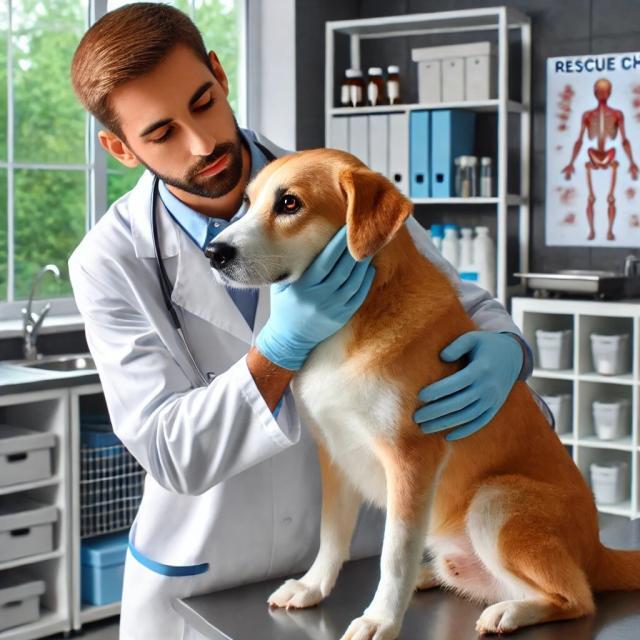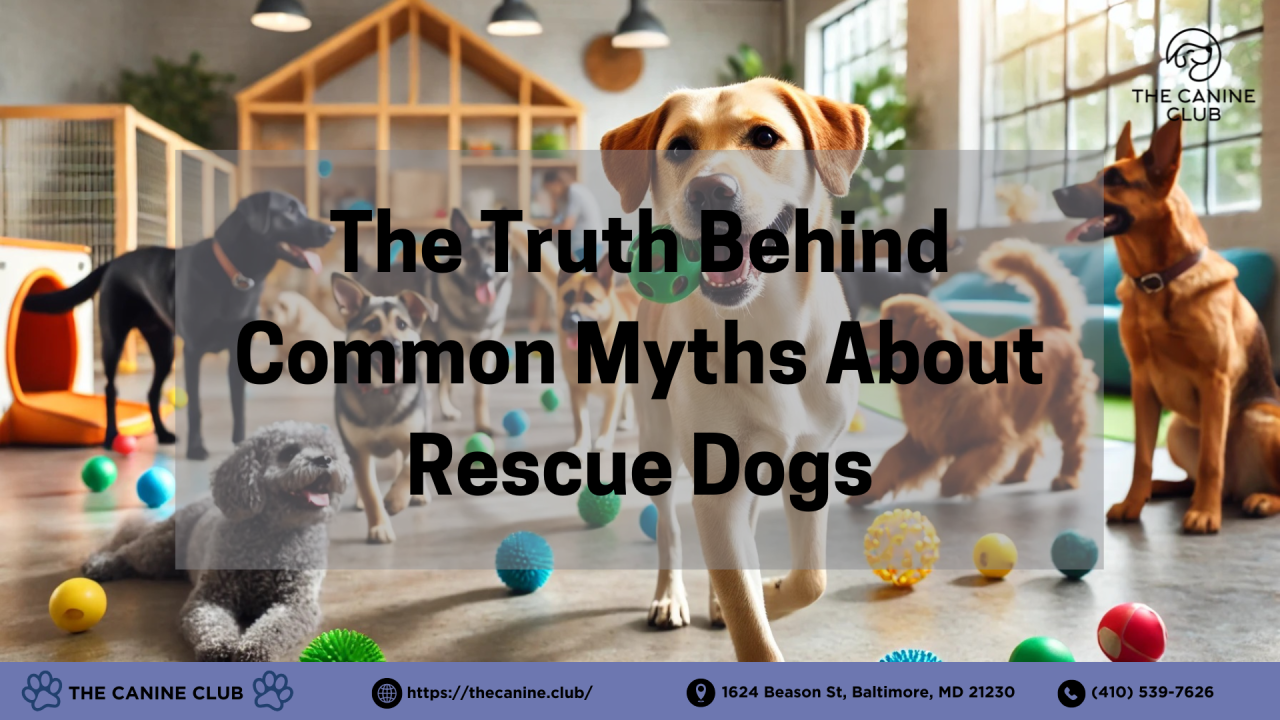When it comes to adopting a dog, many people have preconceived ideas about rescue dogs. From thinking they have behavior problems to assuming they’re always older, these myths can prevent potential pet owners from opening their hearts and homes to a rescue. However, it’s time to bust these common misconceptions. Rescue dogs can make amazing pets, and we’re here to set the record straight by debunking the myths that often surround them.
Myth #1: Rescue Dogs Have Behavior Issues
One of the most widespread misconceptions about rescue dogs is that they come with behavioral problems. It’s easy to assume that because a dog was surrendered or abandoned, it must have been a difficult pet. But this simply isn’t the case.

While some rescue dogs may have had a rough start, many others are simply victims of circumstances, such as owners who can no longer care for them. And just like any other dog, rescue dogs can be well-behaved, especially when given proper training and socialization.
Behavioral issues aren’t exclusive to rescue dogs—any dog can develop behavior problems if they aren’t trained properly or aren’t socialized well. In fact, many rescues are given a head start by being fostered in homes where their behaviors are assessed before adoption. Foster parents can offer valuable insights into a dog’s temperament, making it easier to match the dog with an adopter who can continue training. Dog daycare & socialization is an essential part of this process, especially if you are looking for doggie daycare in Baltimore to help your pet adjust.
Myth #2: Rescue Dogs Are Older and Less Active
It’s a common belief that rescue dogs are mostly older, calmer dogs who aren’t as active or playful as younger dogs. While it’s true that some rescues are senior dogs, there are plenty of young, active dogs available for adoption as well.

In fact, rescue organizations often have puppies and younger dogs waiting for homes. These dogs are just as energetic and playful as those you’d find at a breeder. Whether you’re looking for a dog to accompany you on long walks or play in the yard, rescue organizations have dogs of all ages and energy levels.
Adopting a rescue dog doesn’t mean you have to settle for a slower-paced, senior pet (unless that’s what you’re looking for). There’s a dog out there for everyone, regardless of age or activity level.
Myth #3: Rescue Dogs Have a Troubled Past That Can’t Be Overcome
Another common myth is that rescue dogs come with emotional baggage that’s too difficult to overcome. While some dogs have experienced trauma, it doesn’t mean they’re doomed to have issues for the rest of their lives.

Many dogs in rescues have faced difficult situations, such as abuse or neglect, but with time, patience, and proper care, they can heal and thrive in their new homes. In fact, many rescue dogs are surprisingly resilient, and their capacity to love and bond with their new family is often incredible. How to reduce stress when boarding can guide you on creating a peaceful transition for your rescue dog, whether you’re looking for dog hotels or boarding kennels near me to help them feel comfortable.
Success stories of rescue dogs overcoming their pasts are all around us. Dogs who were once fearful or reactive can become loving companions with the right support and a bit of time to adjust. Rescue organizations also offer ongoing support to help adopters with transitioning a dog into their new home, ensuring they have the tools needed to help their pet feel safe and loved.
Myth #4: Rescue Dogs Are Less Healthy Than Dogs From Breeders
Some people think that rescue dogs are more prone to health problems than dogs purchased from breeders. This is an understandable concern, but it’s simply not true.

Many reputable rescues conduct thorough health checks, vaccinations, and screenings before placing dogs up for adoption. This means that the rescue dog you adopt is likely to be healthy and well-cared-for, especially if they’ve been fostered in a home that attends to their needs.
While no dog is immune to health issues, whether from a breeder or a rescue, it’s important to ask about the dog’s health history before making a decision. Rescues often have detailed medical records and can provide you with information about the dog’s current health status. Additionally, many rescues take steps to ensure the dog receives veterinary care if needed before being adopted out.
Understanding your dog’s health and vaccination needs is crucial. If you’re planning to board your new dog or take them to daycare, read our blog on What Vaccinations Do Dogs Need for Boarding? to ensure you’re prepared. Whether you’re looking for dog boarding near me or luxury dog boarding kennels, we can provide you with the information you need.
Myth #5: You Don’t Know What You’re Getting with a Rescue Dog
Another misconception is that adopting a rescue dog means you don’t know what you’re getting. People worry about hidden health or behavioral issues that may come to light only after adoption.

However, many reputable rescue organizations go to great lengths to assess the dogs in their care. This includes behavior evaluations, medical screenings, and sometimes even fostering in homes where the dog’s personality and temperament are observed before they’re available for adoption.
Rescue organizations also prioritize matching dogs with families based on lifestyle, preferences, and experience, so the adoption process is often a lot more thorough than people realize. Many rescues even offer post-adoption support to ensure the dog adjusts well to their new home.
Myth #6: Rescue Dogs Are Always Mixed Breeds
While mixed-breed dogs are certainly the majority in rescues, many people assume that all rescue dogs are mutts. In reality, there are plenty of purebred dogs in shelters and rescue organizations, waiting for a loving home. You can also read more about choosing between boarding and daycare in our post on overnight boarding or doggy daycare.

Purebred dogs can end up in rescues for a variety of reasons, including being surrendered by their owners or found as strays. So, if you’re looking for a specific breed, it’s worth checking with a rescue organization to see what dogs are available. Many rescues specialize in certain breeds, so whether you’re looking for a Labrador, German Shepherd, or Poodle, you can find purebred dogs in need of homes.
Why Consider Adopting a Rescue Dog?
Adopting a rescue dog is one of the most rewarding experiences a pet owner can have. In addition to providing a loving home to a dog in need, there are several reasons to consider adoption:
- Emotional Reward: Giving a rescue dog a second chance at life is incredibly fulfilling. Many adopters form deep bonds with their rescue dogs, and the emotional reward is unmatched.
- Saving a Life: By adopting a dog, you’re helping to reduce overpopulation in shelters and giving a homeless animal a fresh start.
- Supporting the Community: By adopting from a rescue or shelter, you’re also supporting responsible pet ownership and community efforts to reduce the number of stray and abandoned dogs in Baltimore and Locust Point.
In conclusion, many of the myths surrounding rescue dogs are simply not true. Rescue dogs can be healthy, active, well-behaved, and a perfect match for families of all sizes. Whether you’re looking for a playful puppy, a calm older dog, or a specific breed, rescues offer dogs of all types that can thrive in their new homes.
If you’re considering adopting a dog, think about giving a rescue dog a chance. At The Canine Club, we believe every dog deserves a loving home, and we offer services like dog daycare, grooming, and overnight boarding to help make your rescue dog’s transition smoother.

If you’re considering adoption and want to learn more about keeping your dog active, check out Mental Health Benefits of Dog Daycare You Shouldn’t Overlook, which explores how daycare can positively affect your dog’s mental health and help them feel at home in Locust Point.
Frequently Asked Questions (FAQs)
1. How do I know if a rescue dog is right for me?
Consider your lifestyle, home environment, and energy levels. Many rescues will match you with a dog that suits your needs and personality.
2. What should I look for when adopting a rescue dog?
Look for transparency about the dog’s history and behavior. Ask questions about their health, training, and temperament to ensure you’re a good match.
3. Can rescue dogs be trained successfully?
Absolutely! Many rescue dogs are trained and socialized before adoption. With consistent training and patience, rescue dogs can be just as well-trained as dogs from breeders.
4. Are rescue dogs good with kids and other pets?
Many rescue dogs are fostered in homes with children and other pets, making them well-socialized. Always check with the rescue organization about the dog’s specific behavior and compatibility with other animals.
5. How can I help a rescue dog adjust to my home?
Create a quiet space for your dog to retreat to, establish a consistent routine, and be patient. It can take time for a dog to adjust to a new environment, so make sure to offer plenty of love and support.
Give us a call at (410) 539-7626 or visit our website to learn more. Let’s work together to ensure your pup stays happy, active, and well-socialized!
At The Canine Club, we know every dog is different—and that’s why we offer flexible, personalized care that fits your pup’s unique needs. Whether your dog needs a full week of daycare, an occasional play day, a fresh grooming session, or a safe, comfortable stay while you’re away, we’re here to help.
🌐 Explore our services:
📞 Call 410-539-7626

